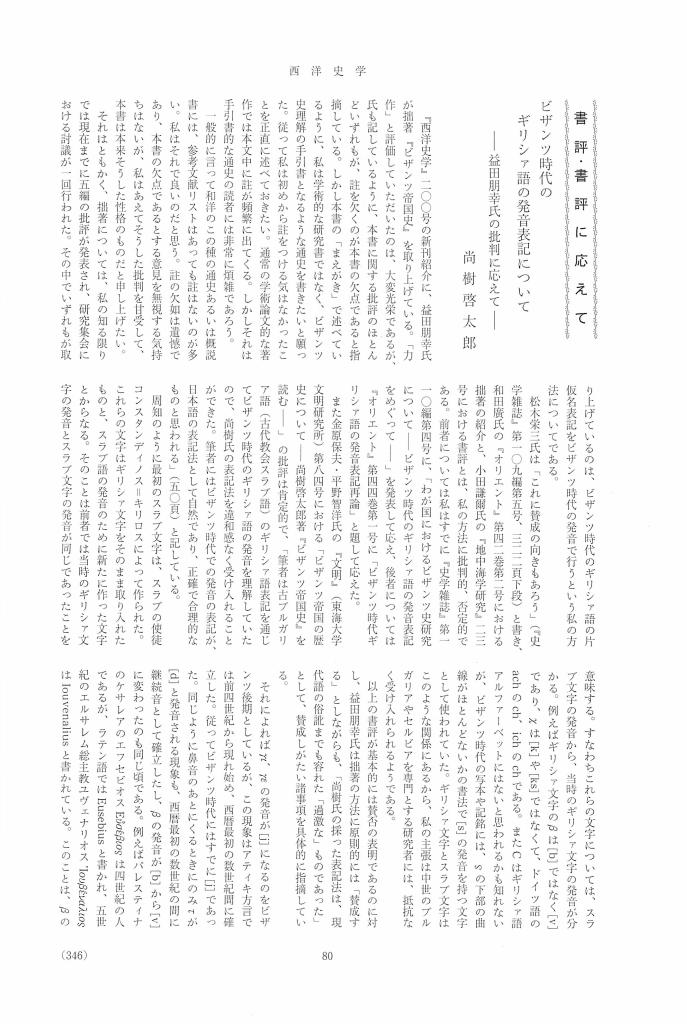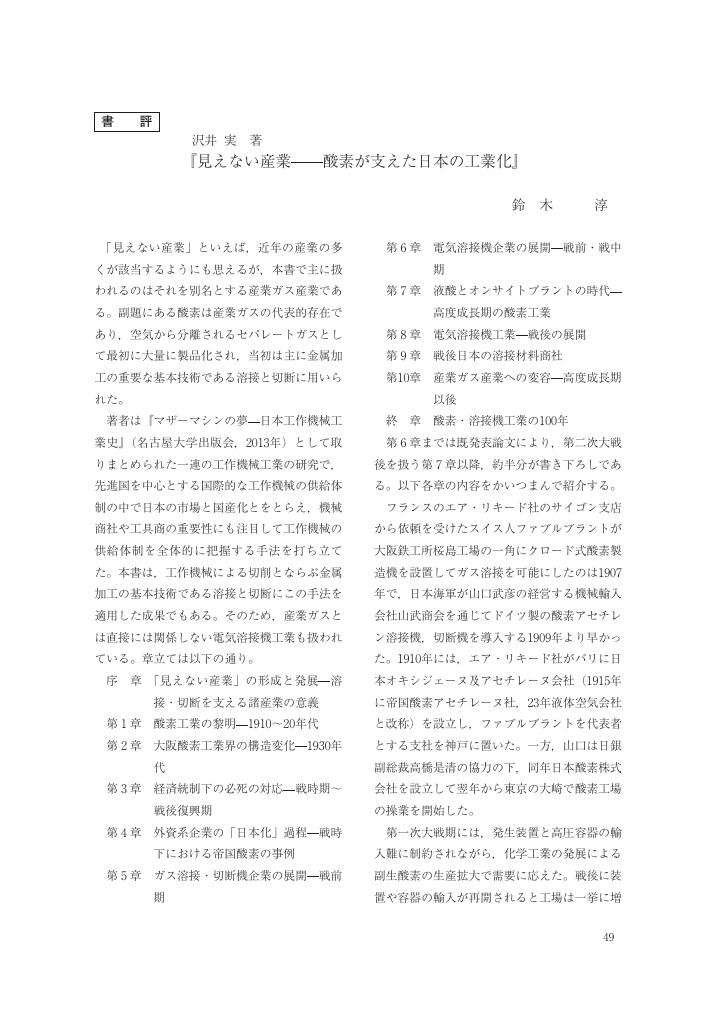1 0 0 0 OA 書評
- 出版者
- 日本西洋史学会
- 雑誌
- 西洋史学 (ISSN:03869253)
- 巻号頁・発行日
- vol.254, pp.64, 2014 (Released:2022-04-29)
1 0 0 0 OA 書評
- 出版者
- 日本西洋史学会
- 雑誌
- 西洋史学 (ISSN:03869253)
- 巻号頁・発行日
- vol.262, pp.84, 2016 (Released:2022-05-03)
1 0 0 0 OA 書評
- 出版者
- 日本西洋史学会
- 雑誌
- 西洋史学 (ISSN:03869253)
- 巻号頁・発行日
- vol.243, pp.74, 2011 (Released:2022-04-22)
1 0 0 0 OA 書評
- 出版者
- 日本西洋史学会
- 雑誌
- 西洋史学 (ISSN:03869253)
- 巻号頁・発行日
- vol.265, pp.55, 2018 (Released:2022-05-04)
1 0 0 0 OA 書評・書評に応えて・編集後記・奥付
- 出版者
- 日本西洋史学会
- 雑誌
- 西洋史学 (ISSN:03869253)
- 巻号頁・発行日
- vol.198, pp.74, 2000 (Released:2022-04-01)
1 0 0 0 OA 書評・書評に応えて
- 出版者
- 日本西洋史学会
- 雑誌
- 西洋史学 (ISSN:03869253)
- 巻号頁・発行日
- vol.222, pp.74, 2006 (Released:2022-04-01)
1 0 0 0 OA 書評・書評に応えて
- 出版者
- 日本西洋史学会
- 雑誌
- 西洋史学 (ISSN:03869253)
- 巻号頁・発行日
- vol.208, pp.87, 2002 (Released:2022-04-01)
1 0 0 0 OA 書評・書評に応えて・編集後記・奥付
- 出版者
- 日本西洋史学会
- 雑誌
- 西洋史学 (ISSN:03869253)
- 巻号頁・発行日
- vol.204, pp.80, 2001 (Released:2022-04-01)
1 0 0 0 OA 書評
- 出版者
- 経営史学会
- 雑誌
- 経営史学 (ISSN:03869113)
- 巻号頁・発行日
- vol.54, no.1, pp.42-82, 2019 (Released:2021-06-30)
1 0 0 0 OA 書評
- 出版者
- 経営史学会
- 雑誌
- 経営史学 (ISSN:03869113)
- 巻号頁・発行日
- vol.53, no.4, pp.55-83, 2018 (Released:2021-03-30)
1 0 0 0 OA 書評
- 出版者
- 経営史学会
- 雑誌
- 経営史学 (ISSN:03869113)
- 巻号頁・発行日
- vol.54, no.2, pp.49-82, 2019 (Released:2021-09-30)
1 0 0 0 OA 書評
- 出版者
- 経営史学会
- 雑誌
- 経営史学 (ISSN:03869113)
- 巻号頁・発行日
- vol.54, no.4, pp.54-83, 2019 (Released:2022-03-30)
1 0 0 0 OA 『善の研究』における純粋経験の究極相 平常性とは何か
- 著者
- 佐野 之人
- 出版者
- 西田哲学会
- 雑誌
- 西田哲学会年報 (ISSN:21881995)
- 巻号頁・発行日
- vol.17, pp.106-121, 2020 (Released:2022-03-11)
The aim of this paper is to clarify the climax of pure experience as normality, as interpreted by Nishitani Keiji. According to Nishitani, pure experience as described by Nishida Kitaro is a standpoint which, while breaking through ordinary experience, does not go beyond it and is nothing more than normality as “pure” experience. Nishitani provides no further explanation of pure experience. Based on An Inquiry into the Good this paper aims to demonstrate in detail what Nishitani does not explain; specifically, how “normality” as a climactic aspect of “pure experience” is formed from the standpoint of “everydayness”, and also a clarification of the concept of “normality”. This paper reaches the following conclusions. Everyday life is indeed pure experience but that is not evident when it is being experienced. In order for pure experience to become evident it needs to be brought into reflection. However, pure experience brought into reflection is only pure experience for reflection, and it is not genuine pure experience. Breaking through this reflective standpoint makes pure experience evident as normality. However, this has an essential inverse correspondence (gyakutaiō, 逆対応) because it appears as a single expression when the reflective standpoint is broken.
1 0 0 0 OA 「永遠の今」において隣人を愛する 『無の自覚的限定』における西田とアウグスティヌス
- 著者
- 高谷 掌子
- 出版者
- 西田哲学会
- 雑誌
- 西田哲学会年報 (ISSN:21881995)
- 巻号頁・発行日
- vol.17, pp.122-136, 2020 (Released:2022-03-11)
This paper explores the meaning of neighborly love in the temporality as the “eternal now”, found in The Self-Aware Determination of Nothingness by Japanese philosopher Nishida Kitaro. Through the development of this work, Nishida shows considerable empathy toward the concepts of love and time by Augustine. However, whether these concepts can support neighborly love has been debated. Augustine limits love for neighbors by adding the condition “only in God”. However, God and neighbors exist in different temporalities; God is eternal, while neighbors are to be lost with time. Nishida develops this point by attempting to define time as “eternal now”. Inspired by Eckhart and Augustine, Nishida develops the concept of time as “eternal now” and “continuity of discontinuity” to depict the exact moment when continuous time emerges from eternity. In such a moment, the continuity of “I” as well as “you” is questioned. His “dialectic of self-love and other-love” leads to the conclusion that “I” can be myself and “you” can be yourself only by loving each other in the “eternal now”—the nexus where history and the creation of God begin.
1 0 0 0 OA 時間と無 前期田辺哲学の「絶対無」理解の変遷と西田の「永遠の今」
- 著者
- 竹花 洋祐
- 出版者
- 西田哲学会
- 雑誌
- 西田哲学会年報 (ISSN:21881995)
- 巻号頁・発行日
- vol.17, pp.45-59, 2020 (Released:2022-03-11)
Tanabe Hajime is famous as the second philosopher to develop a philosophy based on the idea of “absolute nothingness” in modern Japanese philosophy. In a sense, he deserves to be called the philosopher of “absolute nothingness” more than Nishida Kitaro as it remains a core concept until his death while the term “absolute nothingness” gradually becomes inconspicuous in the late philosophy of Nishida. As is well known, however, Tanabe decidedly refused to acknowledge the philosophical value of this idea in the beginning. Why does he accept the concept of “absolute nothingness” in spite of his criticism towards Nishida? How could he continue to find his fundamental standpoint in this idea while disapproving Nishida’s philosophy of “absolute nothingness”? The key to responding to these complicated questions lies in the problem of time, and more specifically, in Nishida’s idea of “the eternal now” and Tanabe’s interpretation of this concept. Therefore, in this paper, I will examine Tanabe’s understanding of “absolute nothingness” by focusing on his attitude towards the central notion in Nishida’s theory of time, namely “the eternal now.”
1 0 0 0 OA 西田における絶対無と個
- 著者
- 美濃部 仁
- 出版者
- 西田哲学会
- 雑誌
- 西田哲学会年報 (ISSN:21881995)
- 巻号頁・発行日
- vol.17, pp.60-76, 2020 (Released:2022-03-11)
1 0 0 0 OA 表現と習得 西田幾多郎の身体論について
- 著者
- 猪ノ原 次郎
- 出版者
- 西田哲学会
- 雑誌
- 西田哲学会年報 (ISSN:21881995)
- 巻号頁・発行日
- vol.17, pp.77-90, 2020 (Released:2022-03-11)
It is said that the concept of body was hugely important for the later Nishida. While I do not disagree with this assessment, I believe it is important to recognize that, although it was concatenated with many other key concepts in his philosophy, Nishida did not explicitly indicate what the significance of the concept of the body actually was. Moreover, I believe that this question of why the body was so significant to Nishida’s work has still yet to be answered. Thus, the aim of this paper is to make the significance of Nishida’s concept of the body explicit by pursuing some conceptual connections that can be found within his thought. First, we need to specify what kind of issues concerning the body were taken up by Nishida. I will consider this question by comparing his description of the historical aspect of bodily activities with the biological, and thus find his central interest to be the semiotic functions of ‘historical body’. Second, I will examine the concept of expression, which Nishida used to deal with the semiotic and mental domains, and thus try to figure out the relation between expression and ‘form’: the relation which determines the normative characteristics of expressions. These examinations will help us understand why such acts of expression should, primarily, belong to the body rather than the mind or subjectivity. Finally, from these conceptions of expression and Nishida’s arguments over acquisition, I will conclude that the significance of the body consists in its semiotic acquisition, especially language acquisition, which radically constitutes the historical dimension of human individuals in the historical world.
1 0 0 0 OA 三木清の遺稿「親鸞」における一考察 後期西田哲学を手がかりとして
- 著者
- 喜多 源典
- 出版者
- 西田哲学会
- 雑誌
- 西田哲学会年報 (ISSN:21881995)
- 巻号頁・発行日
- vol.17, pp.91-105, 2020 (Released:2022-03-11)













